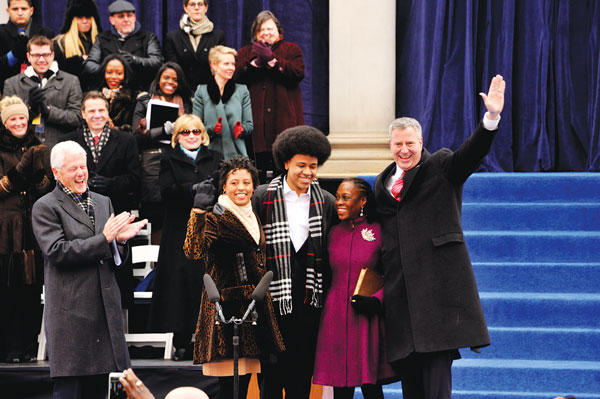
Mayor de Blasio and his family after he took the oath of office Jan. 1
BY PAUL SCHINDLER | When Bill de Blasio stood on the steps of City Hall Jan. 1 to be sworn in as New York’s 109th mayor, nothing in the inaugural ceremony suggested a hint of retreat from the progressive themes his campaign raised. That’s encouraging, but the proving ground will likely be the next six months as the new mayor completes his appointments and develops his first budget.
As he has named his governing team — a process far from complete — de Blasio has emphasized his philosophical harmony with his new staff members, but it is also worth noting that he has primarily drawn from a bench with long experience in past mayoral administrations. He makes a fair point that he can only effect change if his players know the game, but if his appointees are, in fact, to serve as agents of change, the mayor will have to exercise clear and unwavering leadership. To date, the most concrete example of change is the announcement that his new corporation counsel, Zachary Carter, will withdraw the city’s appeal of a federal ruling putting curbs on the N.Y.P.D’s stop and frisk policies and will negotiate a settlement with five men wrongly convicted of a 1989 Central Park rape.
De Blasio won election with strong support from the L.G.B.T. community — in the September primary, he easily bested out lesbian Christine Quinn among voters who identified as gay, lesbian, or bisexual. It is fortunate, though, that gay and AIDS groups are not taking anything for granted.
Leaders in the fight against H.I.V. are making their views known loud and clear — chief among them that it is time for a new health commissioner. In a friendly Jan. 6 letter to the mayor, a group of L.G.B.T. Democratic clubs — including the Stonewall Democrats of New York City, Brooklyn’s Lambda Independent Democrats, and the Lesbian & Gay Democratic Club of Queens — outlined a comprehensive list of priorities it expects the new administration to tackle.
The Democratic clubs’ letter reminds de Blasio of his commitment to baseline the $12 million the city budget has in recent years provided for runaway and homeless youth housing and services and to increase it incrementally $1.5 million each year. With only 253 youth shelter beds available for an estimated nightly population of 3,800 — up to 40 percent of them L.G.B.T. — that commitment represents the bare minimum acceptable. The city — and the state — should be doing a lot more.
When it looks at the problems faced by homeless youth, the city should recognize that those 18-24 face particular risk, since they are often forced into adult shelters, where the environment is particularly dangerous for those who are L.G.B.T. -identified.
The Jan. 6 letter also identifies enforcement of the city’s 2002 transgender rights law as a priority. Two years ago, the police department announced a groundbreaking revision in its patrol guide aimed as ensuring dignified treatment of transgender and gender-nonconforming people. The health department’s restrictive policy requiring evidence of gender reassignment surgery before a new birth certificate with a changed gender designation is issued is long overdue for revamping.
Full implementation of the state’s Dignity for All Students Act is another item on the clubs’ agenda. The Department of Education needs to go further than that, however. On the same day that Carmen Fariña was named the new schools chancellor — and said that school safety had “improved by and large” — the departing Bloomberg administration quietly released a two-year-old study showing that nearly a third of L.G.B.T. students in city schools reported having been bullied. Fariña’s D.O.E. must implement better training and reporting on school violence and bullying, and must also reverse the aversion the Bloomberg and Giuliani administrations showed toward comprehensive sex education.
The three clubs endorsed a top goal of H.I.V. advocacy groups — the enactment in Albany of a measure that would limit the rent payable by clients of the H.I.V./AIDS Services Administration to 30 percent of their monthly income, as is the case generally with otherrental assistance programs. The lack of such a rental cap has made housing stability and even survival precarious for those living with an AIDS disability, but the chief stumbling block to action by the state to date was former Mayor Michael Bloomberg’s determined opposition.
AIDS activists have gone further in their demands, primarily in calling for the replacement of current Health Commissioner Thomas Farley, who, critics rightly point out, has shown little leadership on the epidemic. Gay and bisexual men, particularly — though not exclusively — young men of color, remain at stubbornly high risk for H.I.V. transmission. The L.G.B.T community, the mayor, and a new health commissioner must make this problem a top priority. On this point, the Democratic clubs are right to call for reinstatement of a Citywide Coordinator for H.I.V./AIDS Policy position within the mayor’s office.
I am less persuaded by the clubs’ call for the creation of L.G.B.T. liaison slots in the mayor’s office and in key city agencies. Our community needs strong voices in City Hall and throughout New York’s vast bureaucracy. Too often, however, liaisons serve largely to market their boss to the community rather than advocate for critical community needs.
More important than having L.G.B.T. representatives in each agency is the appointment of skilled members of the community in influential administration positions. Out lesbian Emma Wolfe, a top de Blasio campaign aide, is now his director of intergovernmental affairs. More high quality appointments like that are really what we should be asking for.
Paul Shindler is editor-in-chief of Gay City News, a sister publication of Downtown Express






































